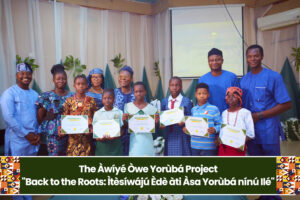
My Mellon project explored Yoruba proverbs as an instructional tool in the teaching of Yoruba language and culture; location was Ile-Ife, Osun state, Nigeria. The primary focus of this community engagement was to provide a suitable framework for the teaching of Yoruba language and culture using proverbs. As opposed to teaching frameworks in schools which are designed to be facilitated by trained teachers/instructors, this framework was simplified in a way that it is not only accessible to children and parents within the home but is also interesting to be taught and learned.
The community engagement was done in four stages: Stage 1 (Material development): this stage included the drafting and publication, in August 2022, of a book of proverbs titled Àwíyé Òwe Yorùbá, a child-friendly textbook that contains Yoruba proverbs, translation, and meanings within a framework that includes questions and activities for competence evaluation. Stage 2 (Participant recruitment): thirty(30) child-participants were admitted into the teaching and study group for the community engagement. The initial evaluation of participants included reading recordings, interviews, and questions related to the attitude of parents and children to Yoruba language and culture learning as well as the actual use of the language and competence in the home. Stage 3 (Language instruction): this was 1-2 hours for two, sometimes three days a week outside of school time for three months. Participants were provided with the resource book, learning materials e.g., writing books and pens, refreshments, and transportation allowance (all free of charge). Stage 4 (Post-project evaluation): the post-project evaluation took the form of surveys, informal conversations, interviews and reading recordings. It also included collection of feedback from participants and their parents for the improvement of the instructional resource. Upon the completion of the community engagement sessions, the resource material- Àwíyé Òwe Yorùbá was adopted by two states, Ò̩yó̩ and Ò̩s̩un, in southwestern Nigeria to be used as supplemental Yoruba texts in Junior Secondary Schools, Senior Secondary Schools, and Technical Colleges across the states.
